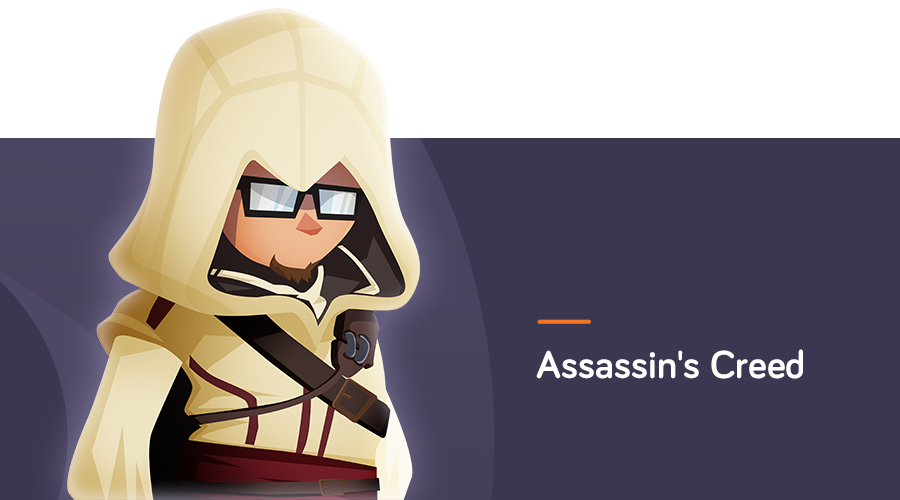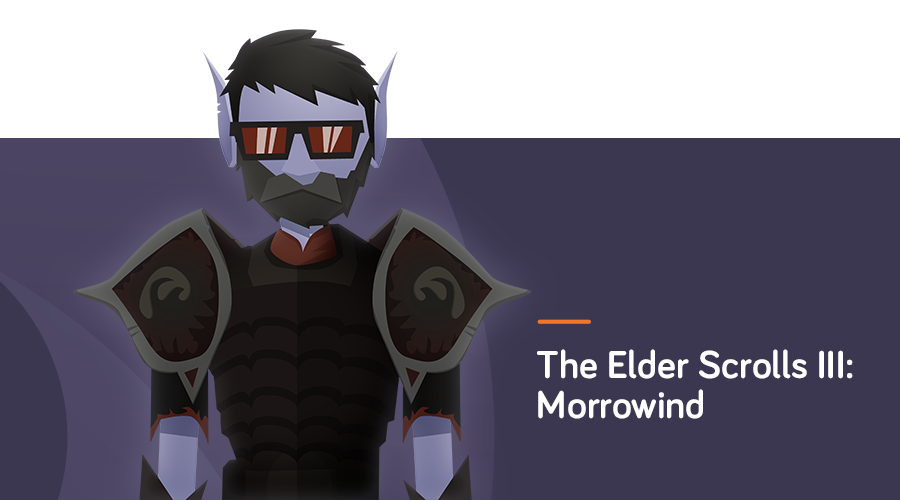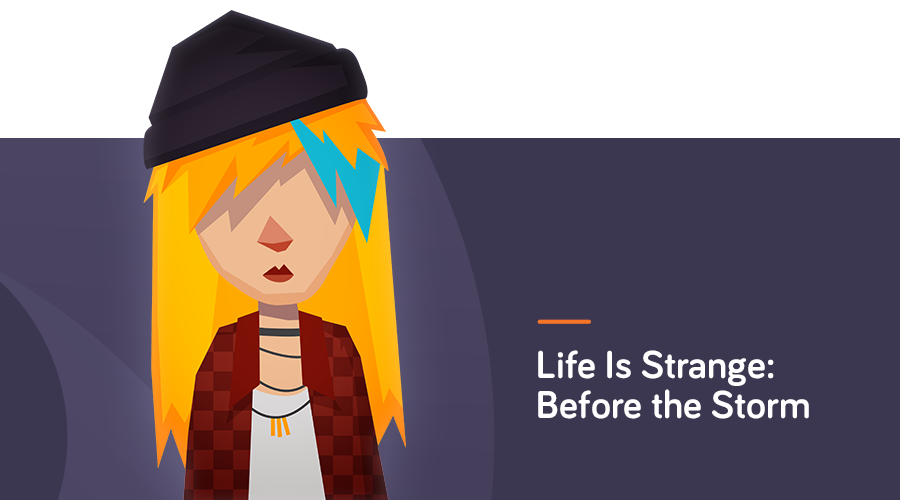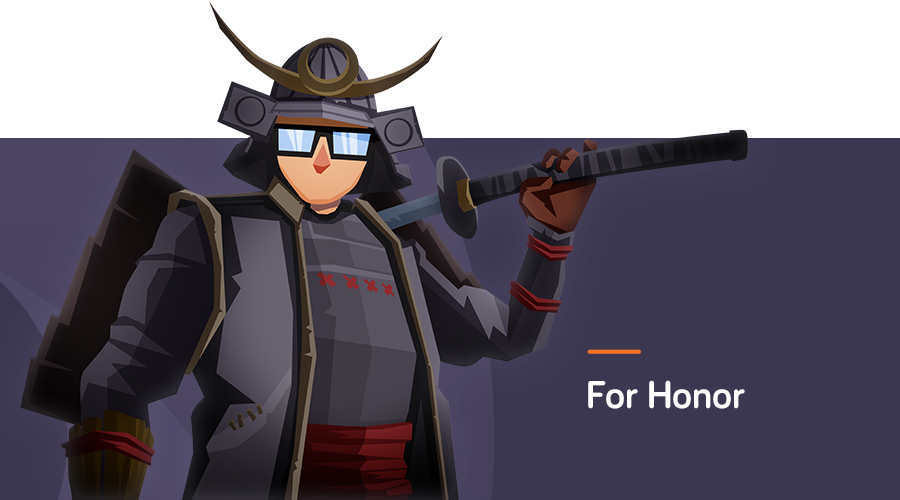Let's see what memoQ gamers prefer to play with these days. The authors come from many different departments like production, marketing and support, but they share one thing in common: they love games.
So come on and be immersed in the world of gaming with us, build a factory using logic in Wube Software’s Factorio, learn history outside of history lectures in Ubisoft’s Assassin’s Creed, save your best friend by rewinding time in Square Enix’s Life is Strange, dive into the medieval fantasy land of Bethasda’s The Elder Scrolls III, and fight wars with medieval knights, samurais and vikings in Ubisoft’s For Honor.

Factorio - Wube Software, Veronika
In Factorio you build a factory, and that’s it. There are no visitors, no buyers, no money, no economy, just simple and pure logistics and resource management.
You mine some iron and some ore, carry them to a furnace, which creates iron plates, then to an assembling machine to design gears. Or instead of carrying, you create transport belts (from the gears) to do the job. And inserters to put them into the furnace - but for those, you need electronics, for which you need copper wire, for which you need copper mining too. At this point, you run out of iron, so you build a couple more furnaces and realize that you should smartly place them so that all can use the same belts. Smart setups are what you aim for when you move forward, to train systems, oil refining, flying robots, and finally to launching a rocket. Or, wait a minute, can I launch more rockets? Like one per minute? How many furnaces and assembling machines would I need for that? Hmm, a couple thousand. It seems I need to rework my base again.
On top of the above, there are hundreds of mods. Some just make your life easier, others introduce further buildings, and there are the ones that about quadruple the complexity, so after a couple of hundred hours in, you can be a fish out of water again.

Assassin's Creed - Ubisoft, Gábor
Assassin's Creed is a franchise that is now over a decades old, and in which your character explores an era and meets famous characters. Each installment brings you to a different time, let that be Ancient Egypt, where you can explore pyramids, or the Italian Renaissance and meet Leonardo Da Vinci or just be a pirate in the Caribbean.
The basic premise is that you are an Assassin, a figure who is part of a secret society. This order fights for the freedom of the people in the world, opposing the Templars who want to take away free will.
I immediately fell in love with the series when playing the game. It is engaging to walk around in cities, and when traveling to some of these locations you’ll see how the cities in the game look the same way as they do today in real-life. You’ll also learn history in an interactive way: I’m still excited to tell the stories of how I met Cleopatra or Napoleon, and helped or opposed them in their ways. Each game has a huge playground, which you can discover. These include London, Rome, Jerusalem and Paris.
The action is intense, you can choose your playstyle in every mission. You can fight your way through the guards to get to your target, or blend in with some scholars, hide, climb and set traps to eliminate your target. The game never gets dull and offers a challenge to overcome.
Life Is Strange: Before the Storm - SQUARE ENIX, Alexa
I don't consider myself a real gamer, but whenever I have time, I enjoy playing games in many different genres.
As a little girl I fell in love with C64 and DOS games, and I loved spending time with my monsters in Dyna or with my favorite enemies in Doom, baking a wonderful cake for my human in Fatty Bear, and many others… there are tons of games I used to play, but I forgot their names. As a teenager and later on as a grown-up, I continued with lifelike games like The Sims, and others that helped me relax by judging and hurting evil thief pigs (Angry Birds). :D A few years ago, I found ‘Life is Strange’. It pulled me in immediately, but the part ‘Before the Storm’ was the one that really forced me to sit down and play.
The game started when I was Max, a photography senior who saved her old friend Chloe by discovering she can rewind time. Isn't it exciting that you can clear your history or some bad decisions, and do or feel things again?
With a nice twist, they introduced the second part as a prelude to the story. ‘Before the Storm’ was a three part adventure set three years before the first game.
As a sixteen-year-old girl - Chloe Price - I became friends with the beautiful and popular Rachel Amber. Rachel found out a secret about her family, and our newfound friendship gave her the strength to carry on. I tried to be a good friend as much as possible, but of course, I had to make hard decisions.
I couldn’t expect every option the game offers to perfectly fit with my ideas of what it should offer, but I didn’t have to get disappointed because there were many opportunities and ways I could improve my life in the game. I had to do my best: First to save Chloe when playing Max; then save Rachel by being the most rebellious person best friend ever.
What I really enjoyed is that the graphics, the music, and the effects all portrayed this melancholic world. Don’t be distracted by some accidental, stereotypical virtue or possibility offered for your character. You can find real treasures if you dive yourself into the rich details.
It’s for you if:
- you like divisive characters,
- you won’t skip a game due to swearing, drugs or guns,
- you fancy a good adventure,
- you are familiar with a life-changing friendship.
Want to learn more about games localization?

The Elder Scrolls III: Morrowind - Bethesda Softworks, Viktor
I remember when I first saw the teaser pictures and videos from Morrowind back in 2000. What greeted me was a roleplay fantasy, a sandbox world, unlike anything that a gamer could’ve experienced before. Against the trend of sterile, concrete cities and grey skylines, this game painted a picture of a diverse, lived in world filled with mythical creatures, like elves and orcs that is dotted with medieval towns, endless green fields, woods, trickling streams and rivers, while sinister vulcanos exploded in the background, spewing lava, making some of the regions desolate and treacherous. It was a picture-perfect setting for a tale, old as time. Step into the shoes of the fabled Nerevarine so that you can stop the evil Daedra hordes influence over Morrowind and Tamriel.
To give you a scope of how massive of an undertaking this project was, it is quoted from the developers that it took close to 100 man-years to create the game. And then 2002 came, and the fifteen-year-old me was finally able to get lost in the world of Tamriel. What I wouldn't expect was the rich lore and background story that was spread across the entire in-game continent. Every person of interest, every town, landmark or events in the past had a history written about it, and through in-game dialogues, quests and books you could’ve learned about every aspect of the game that you were playing. I’m not going to lie: It was a daunting task to get immersed in the world of Morrowind for someone, who was not a native English speaker. But I was interested in the game and curious to uncover the details, and I wanted to learn more about what drove the narrative.
So I grabbed my trusty dictionary and started translating everything that I was unfamiliar with. Words, expressions, everything. Thanks to this, a whole new world opened up for me. I was way more invested in the story, and my actions finally carried weight. Suddenly, the whole 'beat the bad guy' narrative was about preserving the culture of the people of Tamriel, to give them hope and fulfill a destiny that was written through eons.
Needless to say that this practice also improved my language skills a lot. My vocabulary expanded, my reading comprehension got sharper, and I nailed all of my oral exams in high school just by using what I heard through banter in the video games. Morrowind changed the way I was looking at languages. I started seeing them as tools to gather information, a mean to improve myself, to understand my surroundings and to absorb as much knowledge as possible. It broadened my horizon, and it started to affect my real life. Now, when I look at a sculpture or a town square of a foreign city, I begin to wonder about its significance and the history that it carries. I want to explore and learn more about my surroundings, and I always want to learn as much as possible.
All thanks to Bethesda, and the people who worked tirelessly on this game. The simple act of sharing a vision inspired millions, prompting them to embark on a virtual journey that tells a personal story woven by them. I am sure that many others did the same thing as I did, and learned a whole lot about the intricacies of the English language while exploring the lore behind Tamriel. However, I understand that the language barrier will always be an issue when it comes to seamless immersion in the cases of massive role-playing games like Morrowind. Luckily, I am in a position that I can aid the people who are working on bringing these visions to an even broader audience thanks to the magic of localization. Because the Daedra never sleeps (probably, they are immortal after all), and we need all the help we can get to stop them. So pick up a sword, staff or bow and take part in a journey of a lifetime. Oh, and those Daedric Princes? Don’t get me started… you better bring cheese! Don't you understand the reference? You better start playing then!
For Honor - Ubisoft, Dániel
For Honor is one of Ubisoft’s most interesting games. It’s among titles such as Assassin's Creed, Far Cry, The Division or Rainbow Six Siege. I put some hours into all of them, but I just got bored after a while. For whatever reason, I enjoy For Honor the most; enough to keep playing with it since it’s public beta, on a regular basis, a few times a week - but not enough to be competitive.
I first heard of it from a friend who is very much into medieval warfare. Think of the game as a medieval MMA (Mixed Martial Arts). The cling of the armors, stunning graphics, fast-paced nature of combat, and almost “on-demand” access to fighting is an excellent way to spend some online gaming time. Ubisoft created something quite different from other fighting games, probably that’s why I keep coming back to it.
Playing it with friends and online buddies adds a lot. The coordination, the giggles and sometimes the screaming in the heat of the battle completes the feel. It’s always fun to discuss the meta, best way to get things done or counters to moves. Folks in the For Honor Hungary community are quite relaxed, super easy to get along with. Together, we play “Dominion” the most. It is a 4v4 mode with the objective of capturing and keeping points over time. Sounds easy, right? 1v1 situations can be tricky, even with so much time put into the game. Some Heroes perform better against my pick than others, it is sort of a lottery. In a 4v4 mode, however, you are rarely in a 1v1 for too long. Sometimes things break too, glitches that happen, unintended techs nasty players employ just to push you over a ledge (“ledging” is an FH special – essentially environment kill).
The game is in good shape now. However, the global community is not as large as I wish it were, and there are still some glitches and bugs here and there. Ubisoft is actively working on it, releasing fixes, improvements and new content. If you’ve never played it and want to give it a go, prepare yourself for a steep learning curve, rather a cliff. The first few successful moves will, however, fill you with satisfaction few games can trigger.
Thanks for reading the stories of our favorite games. Is your favourite game listed here? Are you playing the best game in the world but our team is not aware of it? Share your thoughts in the comment section below!

memoQ
memoQ is among the world's leading translation management systems. The favorite productivity tool for translation professionals around the globe.



.png)


